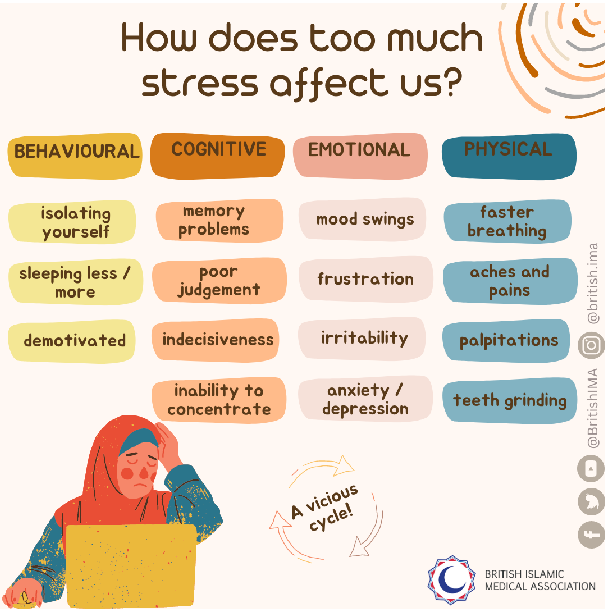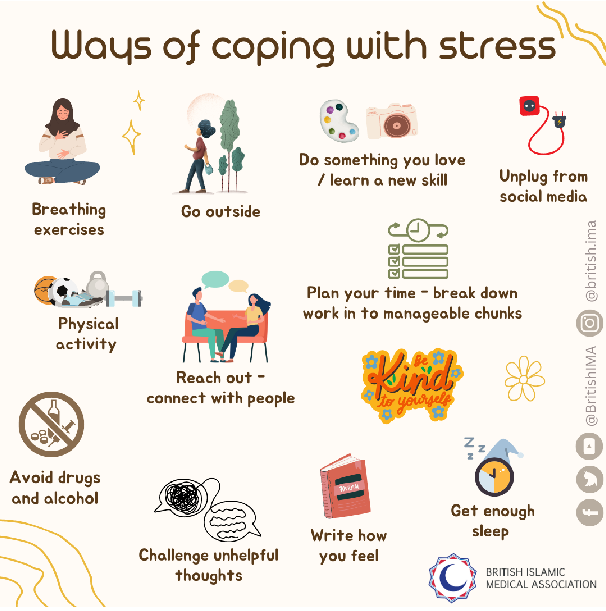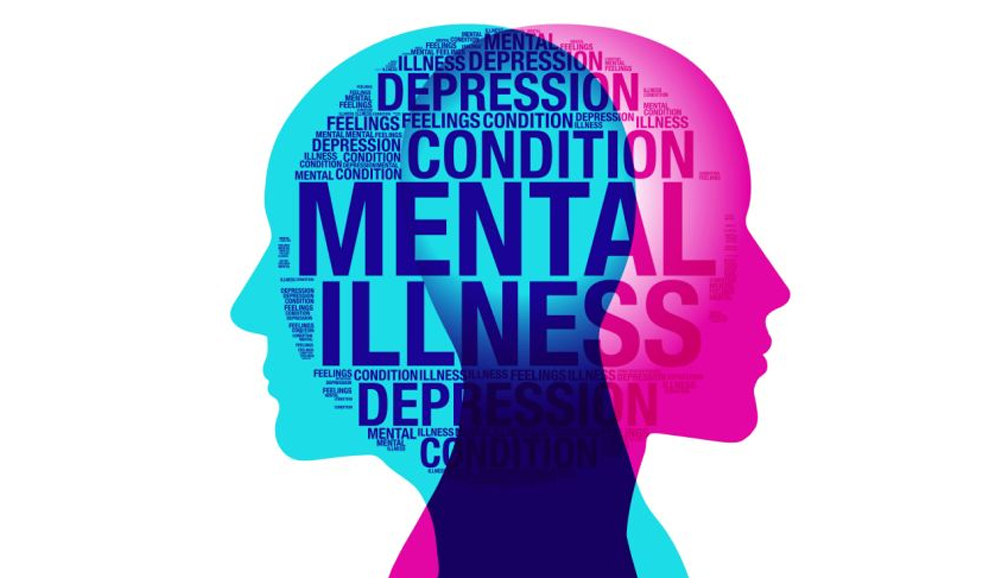
“This is getting too much.”
“What is going on?”
“How do I deal with this?”
“I can’t cope.”
Sound familiar? These are common statements which cross our mind when we undergo stress. We often hear and talk about stressful situations but less often we talk about ways to manage stress. Hopefully this post will serve as a practical guide on how we can manage stress; we first need to be able to identify it, accept it and have the tools to manage it.
Stress is a biological response induced by an internal or external factor1, it causes the body to react to the demands made upon it; therefore, it often facilitates us to do what is required of us for example, helping us to complete daily tasks or motivate us to work towards our ambitions. Stress is universal– everyone feels stress at times.
However, some stress reactions occur when we feel we are unable to manage/control a situation, we may feel under pressure or threatened2. Factors which induce psychological stress can affect one’s mood, sense of well-being, behaviour and health3 – therefore it is important to be able to manage stressors so the aforementioned are not impacted negatively.
Recognising stress
Examples of stressors:
- Deadlines
- Relationship difficulties
- Health problems
- Poor time management
- Exams
- Financial worries
- Daily hassles: misplacing/losing items, home maintenance, inflation
By identifying causes you to feel stressed will help you prepare for these situations and develop coping mechanisms. It is important to note that some stressors are beyond our control therefore remember to seek appropriate external help where necessary. This could be by talking to a family member or friend, a health-care professional or seeking support from a charity service who specialises in supporting individuals with specific difficulties.

Evidence has found that people who have repeated daily hassles have more physiological symptoms of stress and that daily hassles affect stress levels more than life events such as change in residence 4,5.
If you find you are someone who can become overwhelmed with daily
hassles, maybe consider coping strategies to reduce the chance of daily hassles becoming burdensome, for example consider:Organisation: to do lists, completing jobs when you have the highest energy, a rota for chores
Consider ways to optimise finances e.g., using price comparison websites, setting up a monthly direct debit to a savings account
Creating designated space for items and labelling, such as keys, cleaning products, household tools. You could even take photos/write down how you have organised items so you have a reminder you can refer to
Managing stress
Managing an acute high stress situation:
- Take a moment to do deep breathing
- Remember some situations are out of your control
- Contact those you can trust who can help
- Write down the stressor + any positives/negatives linked to it
- Seek support from a support telephone line, charity, local NHS talking therapies service*, your GP, crisis line or A+E if you are in an emergency
- Recite the dua for stress/anxiety/sorrow which translates to the following:
“O Allah, I seek refuge in you from grief and sadness, from weakness and laziness, from
miserliness and from cowardice, from being overcome by debt and overpowered by others”
– [Al-Bukhari 7/158.]
Please note, although stress is a normal part of life for most people – if you find it is leading you to feel anxious or reducing the joy you experience in activities which are usually pleasurable, or leading to thoughts of self-harm/suicide, please contact your GP / CRISIS
number / emergency department*.Adopting changes to maintain healthy stress levels
As we have explored, stressful situations are inevitable, therefore consider lifestyle changes which should help you to maintain a positive mood, sense of-wellbeing, behaviour and health. This may reduce the incidence of negative stress episodes or help you to respond to a stressful situation in a way which is not overwhelming.For example
Be kind to yourself, daily positive affirmations (written or verbal)
Daily gratitude (written or verbal)
Regular physical activity
Avoid drugs/alcohol
Maintain a healthy diet
Health checks including checking blood pressure
Time management – break down tasks into achievable tasks
Connecting with friends/family
Remembrance of Allah – through prayer/dhikr/reading Quran/reading morning and evening dua’s – in a language you understand
When we reflect on how Allah has provided for us, protects us and wants us to fulfil our purpose leading to the perfect final destination, we can find contentment in our worldly hardships. This doesn’t mean they will go away, but it is the coping strategies which will make difficult times easier to bear and with that remembrance there will be reward inshaAllah (God willing).
4 major categories of coping strategies [6]
Problem focused (addresses distressing problem directly)
– Active coping: seek support and information, change environments
– PlanningEmotion focused (reducing negative emotions linked with the stressor)
– Acceptance
– Thinking about a challenging situation more positively e.g., is there a
benefit/upside?
– Turning to religionMeaning focused (cognitive methods to understand and manage a situation)
– Cognitive behavioural therapy – please seek advice from your GP or contact NHS Talking Therapies*
Social coping (support seeking)
– Seeking emotional support from people you trustIslam and difficulty
Surah [93] Ad-Duha7
An example of when the Prophet Mohammed (saw) may have experienced difficulty is when Allah paused the revelation of Qur’an. The disbelievers began to taunt the Prophet (saw) implying Allah had abandoned him. When we think about the Prophet’s mission to spread Islam and revelation being halted, it is as though momentarily the mission seemed as though it may be unfulfillable. Revelation then resumed with Surah Ad-Duha which highlights Allah’s mercy and help:
– ‘Your lord has neither forsaken nor abandoned you’
– ‘Did he not find you an orphan and gave you a refuge’When Allah says, “And your Lord is going to give you and you will be well satisfied”, reflect on the fact you are not alone, He is the ultimate provider of everything and what is to come in the hereafter will be more satisfying than anything in this dunya (earthly existence) insha Allah.
In the Name of Allah, the Beneficent, the Merciful
“By the morning sunlight, And the night when it falls still!
Your Lord O Prophet has not abandoned you, nor has He become hateful of you. And the next life is certainly far better for you than this one. And surely your Lord will give so much to you that you will be pleased. Did He not find you as an orphan then sheltered you? Did He not find you unguided then guide you? And did He not find you needy then satisfied your needs? So do not oppress the orphan, Nor repulse the beggar. And proclaim the blessings of your Lord.” 7“I have this under control” “I know how to prepare” “Allah is with me” “I am going to use this stress to fuel my energy rather than let it deplete me”. After understanding stress, the triggers and managing techniques a little more, maybe these will be some of the thoughts that cross your mind the next time you feel stressed. Our knowledge becomes our power when we put it into practice.
Online resources
NHS talking therapies:
https://www.nhs.uk/service-search/mental-health/find-an-NHS-talking-therapies-service/
Urgent help:
https://www.nhs.uk/nhs-services/mental-health-services/where-to-get-urgent-help-for-mental-health/
Muslim mental health charities:
https://mcb.org.uk/resources/mental-health/
References
1 – Yaribeygi H, Panahi Y, Hedayat S, Johnston T, Sahebkar A. The impact of stress on body function: A review. EXCILI Journal. 2017, 16:1057-1072
2 – Mind. Stress – What is stress? [Online]. 2022. DOA 26.03.2023. Available from: https://www.mind.org.uk/information-support/types-of-mental-health-problems/stress/what-is-stress/
3- Schneiderman N, Ironson G, Siegel S. Stress and health: Psychological, behavioral and biological determinants. Annual Rev Clin Psychol. 2005, 1:607-628
4 – Walsh, RW IB-notes. BLOA: Kanner (Daily Hassles) and Holmes & Rahe (SRRS). [Online]. Year unknown. DOA 26.03.2023. Available from https://robawalsh.wordpress.com/2012/04/14/bloa-kanner-daily-hassles-and-holmes-rahe-srrs/
5 – Kanner A, Coyne C, Schaefer C, Lazarus R. Comparison of two modes of stress measurement: Daily Hassles and Uplifts versus major life events. Journal of behavioural medicine. 1981 4:1-39
6 – Algorani E, Gupta V. Coping Mechanisms. [Online]. STATPearls [Internet]. Treasure Island (FL): StatPearls Publishing 2023. DOA: 26.03.2023 Available from: https://www.ncbi.nlm.nih.gov/books/NBK559031/
7 – The Noble Quran. Ad-Duhaa. [Online] 2023. DOA: 26.03.2023. Available from: https://quran.com/93:4/tafsirs/en-tafisr-ibn-kathir
Post a comment Cancel reply
Related Posts
Prioritizing Mental Health: A Path to Wellness
Small businesses are the backbone of any economy, contributing to job creation, innovation, and community…












